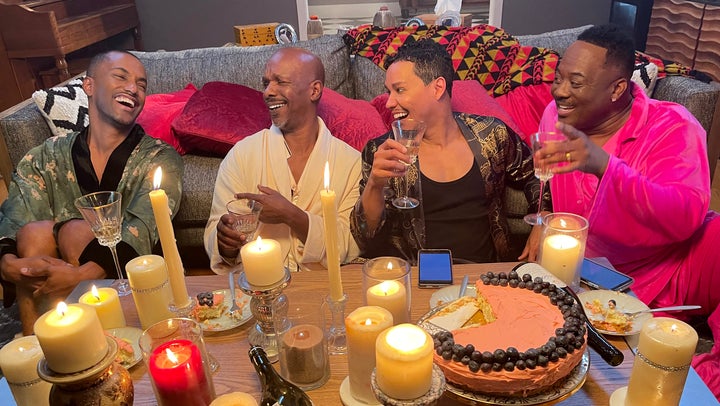
It’s hard to imagine what Black gay storytelling in Hollywood today would look like without “Noah’s Arc.”
Twenty years ago, the trailblazing series premiered on Logo TV, the first queer-focused commercial cable network, offering viewers a rare glimpse into Black and brown gay life. Set in Los Angeles, “Noah’s Arc” centered on the titular screenwriter (Darryl Stephens) and his close-knit group of friends — Chance (Doug Spearman), Alex (Rodney Chester) and Ricky (Christian Vincent) — as they navigated life, love and their careers in a gay West Coast take on “Sex and the City.”
At its core was Noah’s slow-burn romance with Wade (Jensen Atwood), whose struggle to embrace his sexuality added even more depth to the groundbreaking show that became an instant hit among viewers.
“Noah’s Arc” broke new ground when the dramedy debuted in 2005 by unabashedly tackling social subjects like same-sex marriage, homophobia and HIV/AIDS awareness at a time when authentic queer representation — especially of Black and brown lives — was scarce on television. Throughout its two-season run, the bold queer classic became a lifeline for LGBTQ audiences of color, especially those still in the closet, by carving out an affirming space in pop culture that celebrated identity, chosen family and most importantly, visibility.
Although the series was abruptly canceled in 2007, creator Patrik-Ian Polk insists that audiences “never lost interest in us.” That enduring support led to the 2008 TV movie “Noah’s Arc: Jumping the Broom” and the 2020 reunion special, “The Rona Chronicles.” Still, those follow-ups only fueled fans’ desire for a full-fledged “Noah’s Arc” return, as many remained eager to reunite with the beloved crew.
Well, after months of teasing and anticipation, the iconic queer franchise is finally making a comeback to celebrate its 20th anniversary with “Noah’s Arc: The Movie,” premiering June 20 on Paramount+.
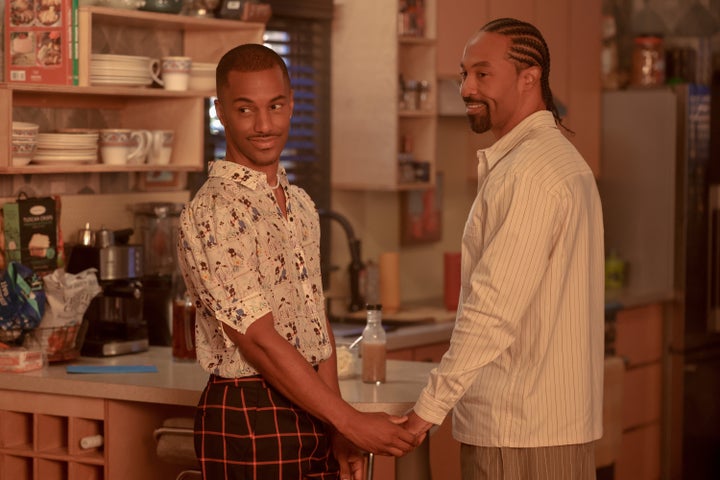
The new film, written and directed by Polk, catches up with the crew as they navigate the complexities of middle-aged monogamy, parenthood and other major life transitions. Noah and Wade are expecting twins via surrogate, just as their careers are hitting new heights. Meanwhile, Alex, Chance and Ricky are going through their struggles of their own.
Without giving away too much, the movie is packed with tons of relationship drama, dizzying laughs and emotional twists that hit close to home — a direct reflection of life’s highs and lows as the crew gets older, just as Polk intended.
“When I started the show 20 years ago, obviously these were characters that were in their 20s or maybe, at the oldest, 30. So, in the movie, we have to evolve with the characters,” the director explains.
As a middle-aged gay man himself, with a host of fellow middle-aged friends, Polk knew the next iteration of “Noah’s Arc” needed to reflect a lived-in reality — one that captured the natural progression of adulthood and the ebbs and flows that come with it, particularly within a queer context.
“Because, contextually, we forget that the AIDS epidemic wiped out a huge chunk of the community,” he continues. “And so the idea of there even being middle-aged Black gay men is kind of a new thing, because we lost a whole generation that didn’t get to see middle age.”
He adds, “It was important to me to be true to these characters and see who they would be 20 years later, and the things that they’re dealing with now as older gay men. I’ve always wanted ‘Noah’s Arc’ to, on various levels, reflect real life, and that is real life.”
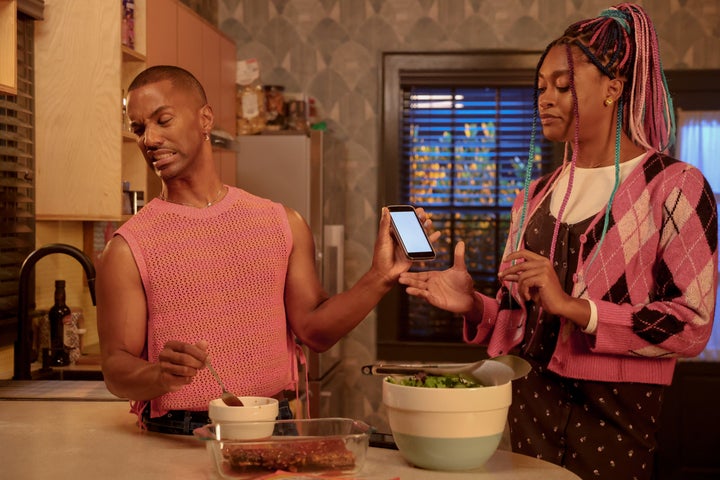
Fans will probably be shocked to see what’s going on with the “Noah’s Arc” crew in the new movie. Still, Polk says the cast — which includes returning stars Gregory Kieth (Alex’s husband), Jonathan Julian (Chance’s husband) and Wilson Cruz (Ricky’s love interest) — was pretty open-minded about their characters’ life changes.
“You know, the beautiful thing is, after all these years of being a part of the ‘Noah’s Arc’ family, I think they’ve really grown to trust my creative vision,” Polk shares. “They’re always excited to see what’s next and what kind of things they’re gonna get to do as actors. They’ve always been willing to ride with me from the beginning, and I really appreciate that.”
Beyond the core ensemble, Polk recruited a ton of new (and familiar) faces to join him on the latest “Noah’s Arc” adventure, such as Jasmine Guy, TC Carson, Eva Marcille, TS Madison and “RuPaul’s Drag Race” star Kennedy Davenport. He also tapped newcomers like K’Hood (who plays Noah and Wade’s surrogate) and Mariyea Jackson (who portrays Alex’s trans daughter) to nurture the next crop of queer talent.
The mix of seasoned and up-and-coming actors representing different parts of the LGBTQ spectrum was deliberate on Polk’s part to emphasize how the new movie is a “cultural love letter” to the community, both older and younger generations.
“Obviously, it’s great to bring back our veterans,” he says. “But it’s wonderful to be able to bring some fresh faces in and mix them in with our cast, because ultimately, even though this is a continuation of the story and the series, I strived to create a movie that if you had never seen ‘Noah’s Arc’ before, you could come to this and enjoy it and be moved by it and get into this story. And then hopefully you go, ‘There’s more. Let me go back.’”
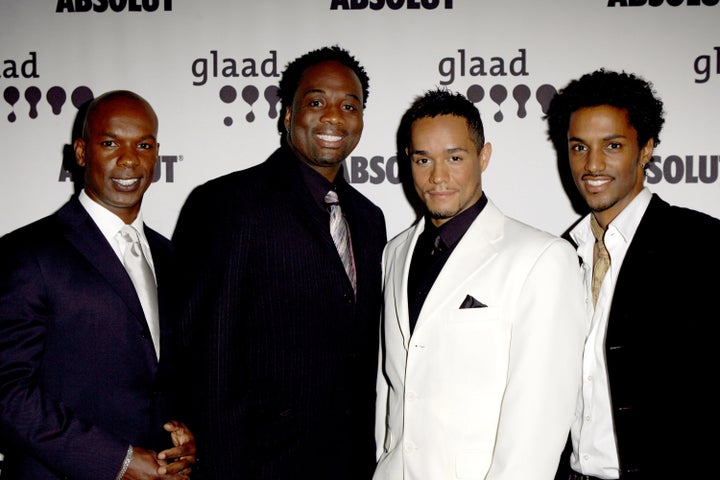
Polk never imagined that a show centered on a group of gay Black men would ever reach mainstream television. In fact, he admits he almost didn’t pitch “Noah’s Arc” to Hollywood, knowing that the cultural climate at the time showed little interest in stories like his.
“No one’s going to make it,” the director recalls telling himself. “So I’m just going to do it on my own.”
That’s essentially what Polk did when he made his first feature film, “Punks,” a 2001 precursor to the “Noah’s Arc” universe and his version of a “gay ‘Waiting to Exhale.’” But years later, during the 2003 Black Gay Pride Weekend in LA, to be exact, he began to wonder what was next for his storytelling career — then an idea struck him.
“This was a ballroom full of people who had come from all over the country to celebrate Black Gay Pride. These people, who have money to spend, are renting hotel rooms and flights and cars, and no one’s making programming aimed at this group,” Polk remembers of the event. “So literally, the idea came to me: I’m going to make a Black gay ‘Sex in the City.’”
And so, “Noah’s Arc” was born — or at least, its earliest version.
Before the show made its cable debut, Polk released a six-minute short on his YouTube channel titled “No Glove, No Love,” which introduced Noah and Wade to the world. In the film, the two come home from a date and are about to have sex for the first time when the condom breaks, thus setting the stage for the daring stories that followed.
“I put it online and it went crazy,” Polk remembers. “So, I knew I was onto something at that point.”
So did MTV Networks, as the conglomerate reached out to Polk about “Noah’s Arc” while it was gearing up to launch Logo TV. By then, Polk had already done most of the groundwork independently: raised money, shot the pilot and scheduled screenings for the show all over the country. He just needed a platform willing to bet on his vision.
“This show that I never really expected to be on TV because I just didn’t think anyone would put it on TV,” the creator recalls of his uncertainty. “Next thing I know, there we were, on television.”
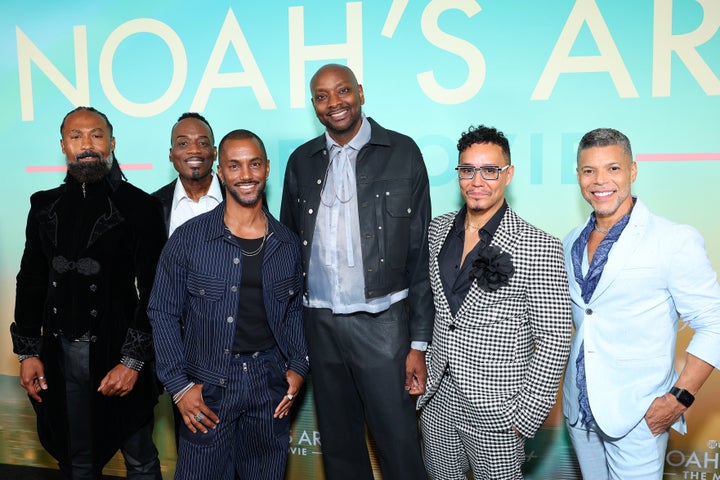
If Logo TV hadn’t picked up “Noah’s Arc” when it did, Polk believes “we wouldn’t be around to this day.” While there were already “lots of white gay stories in TV and film,” he says, queer Black and brown people still lacked that same meaningful representation onscreen. That’s where his show truly stood out — serving as an unapologetic spotlight on queer men of color and their experiences. And despite the uphill battle it took to bring “Noah’s Arc” to life, Polk felt like his relentless mission to amplify his community yielded a powerful takeaway.
“There’s a movie called ‘Field of Dreams,’” the director says, “an old baseball movie, and one of the big lines from that is, ‘If you build it, they will come.’ And so, that was the lesson [for me].”
Another point of inspiration Polk references is Spike Lee’s 1986 directorial debut, “She’s Gotta Have It,” a film he remembers watching as a teenager.
“When I read Spike Lee’s first book, he tells the story of how he made that first movie using his grandmother’s credit card,” the fellow filmmaker recalls. “And his whole motto was, ‘By any means necessary.’ So that was really ingrained in my head as an aspiring independent filmmaker myself.”
“That no one’s going to give you permission to tell your story,” he continues. “No one’s necessarily even going to give you money and the opportunity to tell your story. So what are you going to do? Just go and do it. So, that’s what I did.”
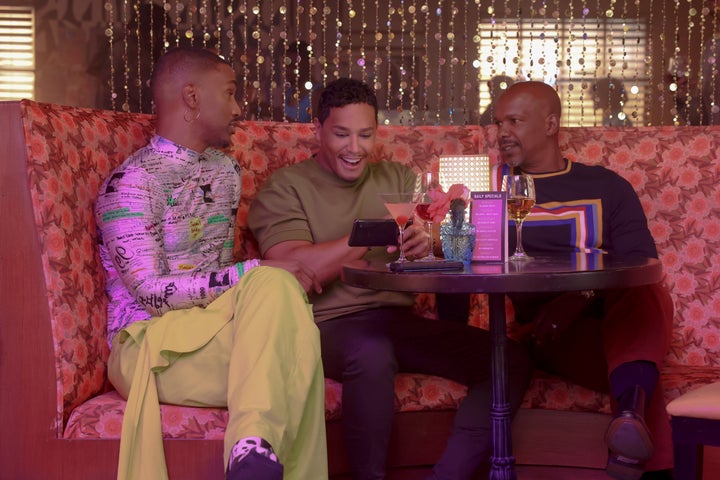
Thanks to Polk’s courageous risks in television, the legacy of “Noah’s Arc” continues to thrive two decades later. Perhaps most meaningful is that current and future generations of queer Black and brown audiences now have another film that can offer them comfort and affirmation — just as the franchise has done for so many since its debut.
“I can’t tell you the hundreds and hundreds of people that have told me in various ways that the show changed their life,” Polk says of the series’ impact, noting that it has now become something like a “rite of passage” for younger audiences who discover it, too.
“[People say] the show helped them come to terms with their sexuality, and their parents come together around their sexuality,” he adds. “So many people tell me they were a teenager watching, literally hiding in the closet or sitting with their finger on the last channel button in case someone walked in… Over and over, story after story from people that were so thrilled to see versions of themselves on camera.”
But filling that void for queer viewers was always Polk’s original intent in creating “Noah’s Arc.”
“It wasn’t just to see myself on screen. It was to show the community what was possible,” he shares. “To show that you could have these different kinds of careers, you could be a college professor and have a husband, and raise children. You could be a drag performer. You could be a writer.”
“It was aspirational because I felt like not ever seeing versions of yourself on screen, you don’t really get a sense of what is possible,” Polk adds. “So much of what we learn as human beings comes through pop culture. So it’s just always important for me that we be out there front and center and a part of it.”
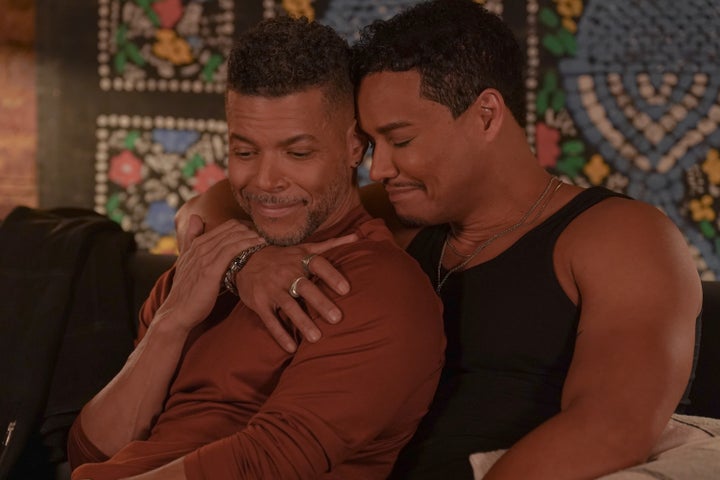
That mission still holds strong in “Noah’s Arc: The Movie.” With the door open for another installment in the franchise, per the film’s ending, Polk says he already has an “active plan” in place.
“I am ready to go. I know exactly where these characters are heading,” he says. “We just need the powers that be to get on board. So my sincere wish and hope is that people show up for the movie on Paramount+, that they watch, rewatch, and let [the streamer] know that there’s an audience for this and we want to see it.”
The director-writer has his fingers crossed that audiences will embrace a “Noah’s Arc” revival in today’s time. But regardless of what happens next, he’s proud to see his show’s longevity resonate with a new generation and remain a cultural staple so many years later.
“I can’t wait to see how the movie travels and how people show up for it,” Polk concludes. “And hopefully, we’ll be back with more.”
“Noah’s Arc: The Movie” starts streaming on Paramount+ June 20.

